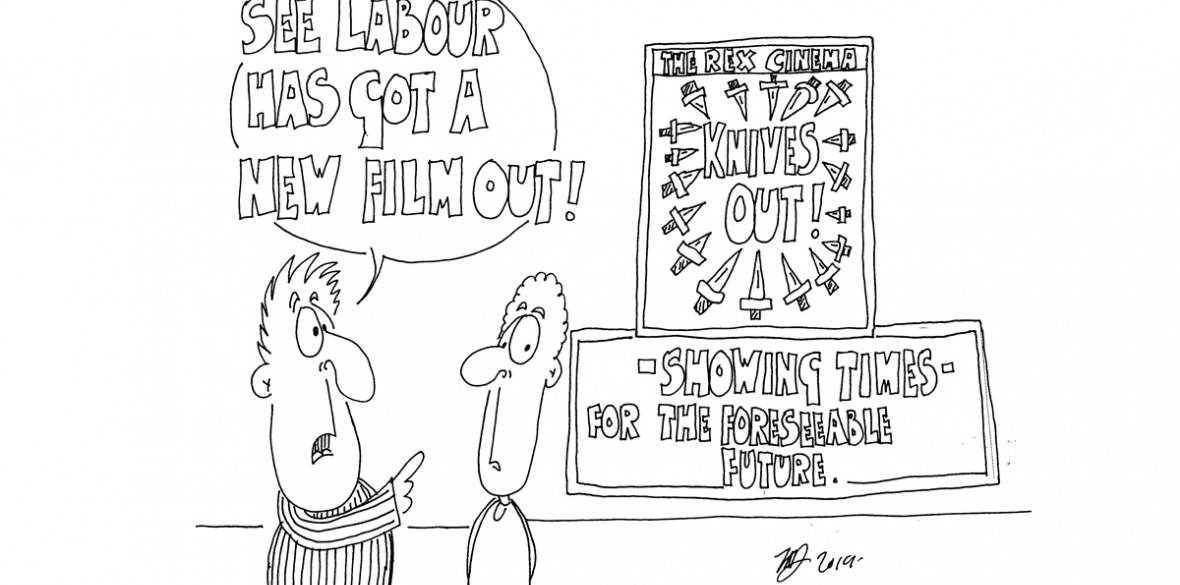This is the last article you can read this month
You can read more article this month
You can read more articles this month
Sorry your limit is up for this month
Reset on:
Please help support the Morning Star by subscribing here
BORIS JOHNSON won and Jeremy Corbyn lost. Labour will need to look hard at why.
Brexit was obviously a big part of it, but, Labour were not able to build on the 2017 campaign, which made progress by offering economic change.
The “insurgent” campaign of 2017, that was made on the hoof and out of sticky tape and spit, worked better than the more planned programme of 2019.
By contrast, the Tories were able to eat into Labour’s vote, both with Brexit , and an “economic offer” that seemed to bite, especially in some previously Labour provincial towns.
We need to look at that seriously. Which is why it is very disappointing to read Ellesmere Port MP Justin Madders arguing on the Labour List website that “We won’t find the answers to our problems at the bottom of a cup of fruit tea in an Islington cafe.”
Labour List makes a really big contribution to the left, hosting debate and reporting news.
So it makes me sad to see their space wasted on this kind of trivial attempt to reduce a serious issue to shallow stereotypes.
Herbal teas are drunk in cafes on every high street in the UK. New cafes serving such teas, as well as lattes, cappuccinos and other “frothy coffees” are a key to regenerating the high street in small towns as well as big cities.
Islington has serious deprivation alongside well-heeled properties. Trying to substitute unconvincing “cultural” posturing for policy won’t work.
Dancing round in flat caps or “cor-blimey” trousers isn’t a substitute for politics.
[Tories] might find it hard to follow through, as any solid offer will involve state activism and an element of redistribution they may struggle with
By contrast, the Sun gave a whole page to Will Tanner, who runs a Tory think tank called Onward to write a 935-word essay on what the Tories need to do to hang on to the “blue-collar” towns they won in the election.
Tanner floated a whole series of policies, many of them borrowed from Labour, like better broadband for the regions and a stronger economic role for local councils. If the Sun is taking policy for small towns seriously while Labour MPs are sounding off about hot drinks, we are in trouble.
If Johnson does some strategic spending aimed at helping small towns and “blue collar” voters, Labour could be in deeper trouble. He could consolidate Tory vote gains that have already put Labour seriously on the back foot.
We may be lucky — though I wouldn’t count on it — because of the contradictions of Conservatism. Johnson wants to make some selected offers to former Labour voters, but they haven’t fully worked out what — hence Tanner getting space in the Sun, or the Times floating ideas about rejuvenating buses and even offering universal free bus travel.
However, their instincts and personnel mean they might find it hard to follow through, as any solid offer will involve state activism and an element of redistribution they may struggle with.
So at the last Tory conference housing minister Esther McVey and Tory MP —– and one-time Conservative Vice Chair — Ben Bradley held meetings about “blue collar conversations,” answering the question “how can the Conservative Party reconnect with working people.”
The events were organised by a group called “Blue Collar Conservatism,” a dormant organisation McVey revived this year. McVey wants the group to “focus on working-class voters” and fight Corbyn’s “posh metropolitan socialism.”
Arguably this mission was very successful in the election.
Electoral Commission figures show who funds this Tory workers’ voice. In July, Michael Spencer gave “Blue Collar Conservatism” £10k. Spencer is definitely Conservative. He was Tory treasurer and donated over £5m to the party. But blue collar? Spencer is — according to the Sunday Times Rich List — the 133rd richest person in Britain, made a billionaire running City financial trading giant NEX Group (formerly ICAP). Spencer’s blue-collar family background includes boarding at public school and going to Corpus Christi, Oxford.
Dancing round in flat caps or “cor-blimey” trousers isn’t a substitute
for politics
Another of Spencer’s companies, called IPGL, which is based in that well-known blue-collar London location, Sloane Street in Knightsbridge, also gave £20k to “Blue Collar Conservatism.”
Blue-Collar Conservatives also got £9k from serial investor Nigel Wray. He is the 405th richest man in Britain, living in a Jacobean mansion in Totteridge, with a £315m fortune, so also not apparently blue-collar.
Esther McVey’s own ability to appeal to “blue collar” voters isn’t always so obvious. McVey lost her Merseyside Wirral West seat to Labour in 2015, and only got back into Parliament by winning the super-safe Tory Tatton seat (previously held by George Osborne) covering posh towns and villages in Cheshire.
These are the personnel that Boris will be relying on the hang on to his “blue collar” vote.
I think there is a strong chance that a group funded by City traders will actually struggle in coming up with a convincing economic project that binds in working-class voters in small towns. They might end up reverting to right-wing populist slogans about crime and patriotism.
But we can’t count on it. We certainly don’t have the luxury of wasting time with arguments about hot drinks.











